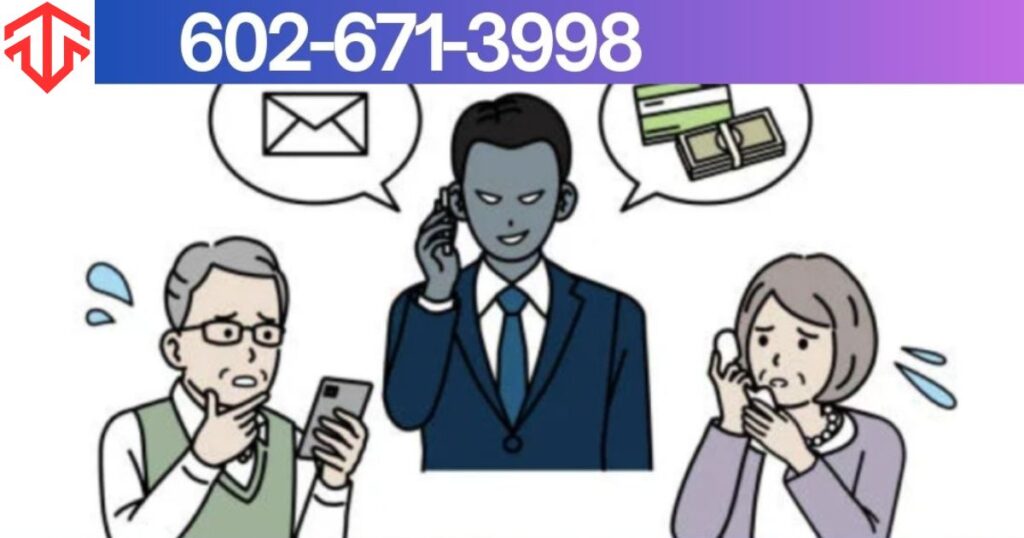In today’s interconnected world, our phones have become both a blessing and a curse. While they keep us connected to loved ones and important information, they also open the door to unwanted intrusions from telemarketers, scammers, and robocalls.
One number that has been causing concern for many is 602-671-3998. This guide aims to shed light on this specific number and provide you with comprehensive information about telemarketing calls, how to recognize potential scams, and what actions you can take to protect yourself.
Understanding Telemarketing and Robocalls
Telemarketing uses live callers, while robocalls employ automated systems with pre-recorded messages. Both can be legitimate business practices, but they’re often associated with unwanted solicitations or fraudulent activities, leading to consumer frustration and potential security risks.
Defining Telemarketing
Telemarketing is a direct marketing strategy where salespeople contact potential customers via telephone to sell products or services. While some telemarketing calls are legitimate business practices, others can be intrusive, unwanted, or even fraudulent.
The Rise of Robocalls
Robocalls have become increasingly prevalent in recent years. These are automated phone calls that use computerized autodialing systems to deliver pre-recorded messages. While some robocalls serve legitimate purposes like appointment reminders or school closings, many are used for scams or unwanted marketing.
Common Types of Scams
Phone scams come in various forms, each designed to trick unsuspecting individuals into giving away personal information or money. Some common types include:
- IRS Scams: Callers impersonating IRS agents threaten legal action unless immediate payment is made.
- Tech Support Scams: Scammers claim to be from well-known tech companies and offer to fix non-existent computer problems.
- Lottery or Prize Scams: Victims are told they’ve won a prize but must pay fees or taxes to claim it.
- Charity Scams: Fraudsters pose as representatives of charitable organizations, especially after natural disasters.
- Medicare Scams: Callers claim to be from Medicare and ask for personal information to “update” records.
Recognizing the Signs of a Scam

Scam calls often exhibit telltale signs: high-pressure tactics, requests for immediate action, demands for personal information or unconventional payments (like gift cards), and claims of impending legal trouble. Be wary of unfamiliar numbers and callers creating a false sense of urgency or making unusual requests.
Pressure Tactics
One of the most common red flags in potential scam calls is the use of high-pressure tactics. Scammers often create a sense of urgency, insisting that you must act immediately or face dire consequences. They might claim that you’ll miss out on a once-in-a-lifetime opportunity or that you’re in legal trouble if you don’t comply with their demands right away.
Unfamiliar Numbers
While not all calls from unknown numbers are scams, it’s wise to be cautious when receiving calls from unfamiliar area codes or numbers. Scammers often use numbers that appear to be local to increase the likelihood that you’ll answer. However, with modern technology, it’s easy for callers to “spoof” their numbers, making them appear to be from anywhere in the world.
Unusual Requests
Be wary of callers who make unusual or suspicious requests, especially those involving money or personal information. Scammers might ask you to:
- Make payments using gift cards, wire transfers, or cryptocurrency
- Provide sensitive personal information like Social Security numbers or bank account details
- Allow remote access to your computer or other devices
- Keep the conversation secret from friends and family
Legitimate organizations typically have standard, secure methods for transactions and won’t ask you to use unconventional payment methods or share sensitive information over the phone.
Read This Blog: Super Mario Wonder Imagesize:2894×4686 Improves Visual Appeal
Investigating the Number 602-671-3998
To investigate the number 602-671-3998, start with online searches and reverse lookup tools. Check consumer report websites and scam databases for any mentions. Look for patterns in user reports about the nature of calls from this number to determine if it’s legitimate or potentially fraudulent.
Online Research
When you receive a call from an unfamiliar number like 602-671-3998, the internet can be a valuable resource for investigation. Start by conducting a simple search of the number. You may find forum posts, blog articles, or social media discussions from others who have received calls from this number.
Reverse Lookup Tools
Several online tools and websites offer reverse phone lookup services. These can provide additional information about the origin of the call, including:
- The name of the individual or company associated with the number
- The location where the number is registered
- Whether the number has been flagged as spam or scam by other users
While these tools can be helpful, it’s important to remember that the information they provide isn’t always 100% accurate or up-to-date. Use them as one part of your overall investigation strategy.
Consumer Reports and Scambusters
Websites dedicated to consumer protection and scam awareness can be excellent resources when investigating suspicious phone numbers. Organizations like the Better Business Bureau, Consumer Reports, and various “scambuster” websites often maintain databases of known scam numbers and provide detailed reports on common scam tactics.
Protecting Yourself from Telemarketing and Robocalls

To protect yourself from unwanted calls, register with the National Do Not Call Registry, use call-blocking features on your phone, and be cautious about sharing personal information. Consider using third-party apps for additional screening. Stay vigilant and hang up on suspicious calls immediately.
Do Not Call Registry
The National Do Not Call Registry is a free service provided by the Federal Trade Commission (FTC) that allows you to opt out of most telemarketing calls. By registering your phone number, you make it illegal for most telemarketers to contact you. Here’s how to use it:
- Visit donotcall.gov or call 1-888-382-1222 from the phone you want to register.
- Provide the required information, including your phone number and email address.
- Your registration is effective the next day and never expires.
Keep in mind that while this registry significantly reduces telemarketing calls, it doesn’t stop all of them. Certain organizations, such as charities, political groups, and companies you’ve done business with, may still be allowed to call you.
Caller ID Spoofing
Caller ID spoofing is a technique used by scammers to disguise their true phone number, making it appear as if the call is coming from a different number. This can make it challenging to identify and block unwanted calls. To protect yourself:
- Be skeptical of caller ID information, especially for unfamiliar numbers.
- Don’t rely solely on area codes to determine a caller’s location.
- If you’re unsure about a caller’s identity, hang up and call back using a number you know is legitimate.
Phone Settings
Modern smartphones offer various built-in features to help manage unwanted calls:
- Call Blocking: Most phones allow you to block specific numbers directly from your call log.
- Do Not Disturb: This feature can silence calls from numbers not in your contacts list.
- Spam Filters: Many phones now have built-in spam detection that can warn you about potential spam calls.
- Third-Party Apps: Consider downloading reputable call-blocking apps for additional protection.
Explore your phone’s settings to see what options are available and configure them to suit your needs.
Avoiding Phishing Attempts
Phishing is a common tactic used by scammers to trick you into revealing sensitive information. To avoid falling victim to phishing attempts:
- Never give out personal information over the phone unless you initiated the call to a number you know is legitimate.
- Be wary of callers who claim to be from government agencies, banks, or tech companies. These organizations typically don’t call unsolicited to ask for personal information.
- If a caller claims to be from a company you do business with, hang up and call the company directly using a number from their official website or a recent bill.
- Don’t click on links or download attachments sent via text message or email from unknown sources, even if they claim to be related to a recent phone call.
Read This Blog: Mastering The Quest For Bring Blorbo The Shrewd 25 Hobgoblin Hides
Reporting Scams and Taking Action
Reporting scams is crucial for consumer protection. The Federal Trade Commission (FTC) and state Attorney General offices are primary channels for filing complaints. Report suspicious calls, providing details like phone numbers and conversation content. These reports help authorities investigate and combat fraud.
Federal Trade Commission (FTC)
The FTC is the primary agency responsible for protecting consumers from fraudulent, deceptive, and unfair business practices. If you suspect a call from 602-671-3998 or any other number is a scam:
- Visit ftc.gov/complaint or call 1-877-FTC-HELP to file a report.
- Provide as much detail as possible about the call, including the phone number, date and time of the call, and what was said.
- Your report helps the FTC investigate and take action against scammers.
State Attorney General’s Office
Your state’s Attorney General’s office is another valuable resource for reporting and combating phone scams. They often have dedicated consumer protection divisions that can:
- Investigate complaints about suspicious calls and potential scams.
- Provide additional resources and guidance specific to your state’s laws.
- Take legal action against persistent violators.
Legal Action
In some cases, particularly if you’ve suffered financial loss due to a scam, you may want to consider legal action. While this can be a complex process, it’s worth exploring if you’ve been significantly impacted. Consider the following steps:
- Consult with a consumer protection attorney to understand your options.
- Gather all relevant documentation, including call logs, any recordings (if legal in your state), and financial records.
- Explore the possibility of joining or initiating a class-action lawsuit if others have been similarly affected.
Remember that legal action should typically be a last resort after exhausting other reporting and preventive measures.
Frequently Asked Questions
What should I do if I answer a call from 602-671-3998?
If you answer, remain cautious. Don’t provide personal information and consider hanging up if the call seems suspicious.
Can blocking 602-671-3998 stop all unwanted calls?
Blocking this number may help, but scammers often use multiple numbers. Consider using broader call-blocking solutions for better protection.
Is it safe to call back 602-671-3998 if I missed a call?
It’s generally safer not to call back unfamiliar numbers. If it’s important, they’ll likely leave a message or try again.
How can I tell if a call from 602-671-3998 is a scam?
Look for pressure tactics, unusual requests, or demands for personal information. These are common signs of potential scams.
What legal actions can I take against persistent callers from 602-671-3998?
You can report them to the FTC, your state Attorney General, or consult a lawyer if you’ve suffered financial losses.
Conclusion
In today’s digital age, staying informed and vigilant is crucial to protecting yourself from unwanted calls and potential scams. Whether you’re dealing with calls from 602-671-3998 or any other suspicious number, the key is to remain cautious and proactive.
By understanding the nature of telemarketing and robocalls, recognizing the signs of potential scams, and knowing how to investigate suspicious numbers, you can significantly reduce your risk of falling victim to fraudulent activities. Utilize the tools and resources available to you, from phone settings and blocking apps to government registries and reporting mechanisms.

Fatima is an experienced content writer and digital marketer, skilled in creating SEO-friendly content that resonates with audiences. She helps brands enhance their online presence through targeted campaigns, with expertise in blog writing, social media management, email marketing, and SEO optimization.





